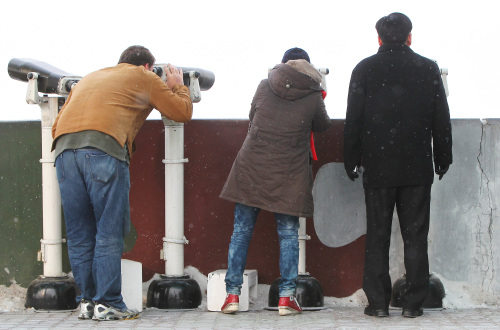North Korea is stepping up efforts to persuade a reluctant South Korea into having talks, apparently realizing that inter-Korean dialogue is its only hope of resuming larger-scale talks with regional powers and thereby securing much needed aid.
The North called for better ties with Seoul in its New Year’s editorial, and has repeatedly proposed, through both official and unofficial channels, to iron-out differences through a long-stalled dialogue between the two sides since then.
Doubting the veracity of the proposal, South Korea insists that the North must first come clean and apologize for last year’s two deadly attacks, which cost the lives of dozens of sailors and two civilians.
“Whether we are sincere or not will be proven when we meet face-to-face,” Pyongyang said in an editorial carried by its official media Tuesday, a day after Seoul’s Unification Ministry officially dismissed the proposal as “inappropriate.”
Pyongyang also blamed Seoul for the high tensions on the peninsula in the editorial, apparently criticizing the South for snubbing the talks that could help defuse tensions.
The North called for better ties with Seoul in its New Year’s editorial, and has repeatedly proposed, through both official and unofficial channels, to iron-out differences through a long-stalled dialogue between the two sides since then.
Doubting the veracity of the proposal, South Korea insists that the North must first come clean and apologize for last year’s two deadly attacks, which cost the lives of dozens of sailors and two civilians.
“Whether we are sincere or not will be proven when we meet face-to-face,” Pyongyang said in an editorial carried by its official media Tuesday, a day after Seoul’s Unification Ministry officially dismissed the proposal as “inappropriate.”
Pyongyang also blamed Seoul for the high tensions on the peninsula in the editorial, apparently criticizing the South for snubbing the talks that could help defuse tensions.

“The inter-Korean relations would not have entered as catastrophic a state as they have now had the South kept pace with our earnest efforts,” it said.
While keen to make peace with its unpredictable rival, South Korea appears reluctant to yield so easily after having suffered the deadly attacks that North Korea either denies or blames on Seoul.
Pyongyang apparently torpedoed a Seoul warship in March and bombed a border island in November last year, ratcheting up tensions to the highest level since the two sides temporarily ended war with an armistice in 1953.
Receiving an official proposal from North Korea to hold working-level government talks in a border town later this month, South Korea repeated its demand for Pyongyang to first “make the appropriate measure” about its most recent attack that killed civilians and wrecked homes.
“North Korea is refusing to admit its responsibility while apparently proposing talks to receive economic assistance,” Seoul’s Unification Ministry, which handles affairs with Pyongyang, said in a statement.
“There cannot be any sincere dialogue between the South and the North” until Pyongyang first admits its sinking of the warship Cheonan and attack on Yeonpyeong Island, the ministry added.
The two Koreas reopened their Red Cross hotline at a border truce village Wednesday for the first time in eight months, but Seoul’s Unification Ministry said it has no plans to return officials to the Gaeseong office as they would “serve no purpose” as cross-border trade remains stalled.
South Korea suspended trade with the North after a multinational team of experts concluded Pyongyang torpedoed the South Korean warship Cheonan.
Another thorny issue that North Korea refuses to address in the inter-Korean dialogue is its denuclearization process.
North Korea, which has conducted two atomic tests, refuses to address its nuclear arms in the talks with Seoul, arguing they are not intended for attack against South Korea.
The U.S., which is a key member of the stalled six-nation talks aimed at denuclearizing North Korea, has been calling on the communist state to “take into action” its previous agreement to disarm by imposing a moratorium on nuclear and missile testing.
Washington also claims North Korea should first solve issues with Seoul before rejoining the aid-for-denuclearization talks with four other regional powers including China, Japan and Russia.
Despite its tough rhetoric, South Korea will have to give in to Pyongyang’s demands to enter dialogue sooner or later to avoid being left on the sidelines of talks that have a direct effect on the peninsula, analysts say.
Having suffered several economic and diplomatic conflicts with Beijing last year, Washington is largely expected to opt to work with the world’s second-largest economy in dealing with Pyongyang. On Jan. 19, U.S. President Barack Obama will meet with Chinese leader Hu Jintao in Washington.
The six-nation talks have been stalled since December 2008, when Pyongyang left the negotiating table and conducted a second atomic test.
While North Korea’s two traditional allies, China and Russia, have been calling for an immediate resumption of the talks, which could secure outside aid for Pyongyang, the U.S., Japan and South Korea have been keener to condemn and further isolate the communist state for its provocations.
North Korea, which suffered serious flooding of its farmland last year, appears to be backing down, eager for the food and fuel it will likely receive once the six-party talks restart.
A typical pattern of behavior for the reclusive communist state has been to escalate provocations before returning to peace talks to maximize its negotiating power and induce partners into giving it more aid.
North Korea also unveiled a new uranium enrichment facility to a visiting U.S. scientist in November, sparking concerns over a third nuclear test and increasing fears over nuclear threats. The facility could serve as a second way of producing nuclear bombs with highly enriched uranium.
By Shin Hae-in (hayney@heraldcorp.com)

















![[KH Explains] Hyundai's full hybrid edge to pay off amid slow transition to pure EVs](http://res.heraldm.com/phpwas/restmb_idxmake.php?idx=652&simg=/content/image/2024/04/18/20240418050645_0.jpg&u=20240419100350)

![[Today’s K-pop] Zico drops snippet of collaboration with Jennie](http://res.heraldm.com/phpwas/restmb_idxmake.php?idx=642&simg=/content/image/2024/04/18/20240418050702_0.jpg&u=)